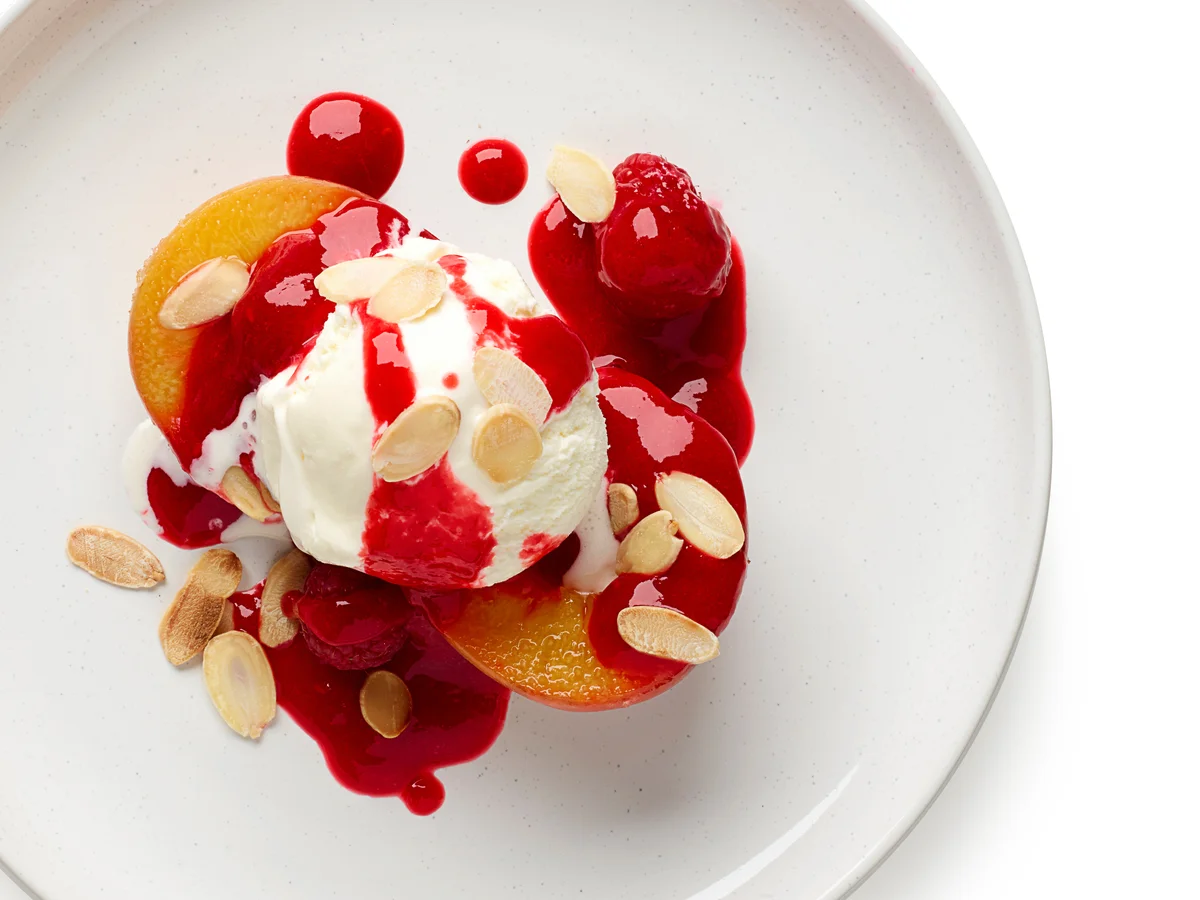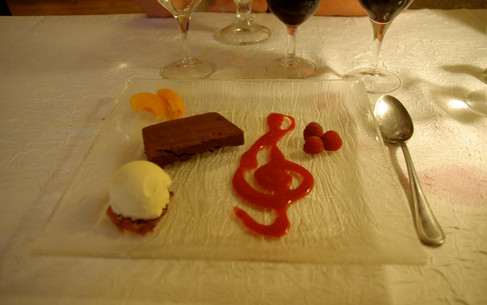"If music be the food of love, play on" William Shakespeare

Or should it be "If food be the music of love then cook on" ? Yes I know - a bit cute on all counts - but I couldn't resist really, and it is a tiny bit appropriate as we shall see.
For today I am moving on through my school curriculum with music, which I suspect will not have much connection to how you can include food in a school's music curriculum but more to do with the symbiotic relationship between food and music. But you never know. I may find that music curricula these days have food units. We'll see.
Well no they don't - at least at the higher levels but at Primary school there were instances of getting children to sing songs about food - either already known, or created for the purpose. I think it was a combination of encouraging creativity - get the children to write the lyrics - and education about food. Learn about what was the right food to eat through song. But this is not the music curriculum it's the nutrition curriculum.
So I'm giving up on the music curriculum and turning to the almost scientific connection between music and food. There are a few different aspects to this, most of it backed up by actual scientific studies that various bodies have made. First a general kind of statement:
"Listening to music makes you happier. It is not just an expression or a cliché: it is the science that proves it. Numerous studies, in fact, confirmed the close correlation between music and the benefits it brings to the psyche and human health. How is this possible? Essentially the human being is chemistry both in body and in thought, and music, thanks to its specific and peculiar vibrations, is able to modify some imbalances acting precisely on the chemical bonds of which man is composed. Therefore, among the main benefits related to music, there are its ability to reduce anxiety, thanks to the production of oxytocin, but also its anti-stress role or the characteristic of facilitating the understanding of the emotions you are feeling." Dialbrodo
At first I thought, but music can make you feel sad too, but I guess that "facilitating the understanding of the emotions you are feeling" could be applied to all those lost love songs you listened to so mournfully when your young self's heart was broken. Nothing to do with food though.
There are two more scientific music/food connections - well probably more, but two that I found.
The first is that:
"sounds have even been shown to affect flavour: sweet foods are supposed to pair well with high-pitched sounds, whereas lower-pitched sounds enhance a food’s savouriness. So bakeries could do well to pump out the Kate Bush and the Bee Gees, and pizzerias might want to stick to Tom Waits and Barry White." Alexandra Carlton/Gourmet Traveller
Which means apparently that you can persuade people addicted to sweet foods, that less sweet foods are actually sweet. Though how would you put that into practice?
Or music can make you buy - and there is plenty of evidence for that. According to a study made by the University of Bath:
"Weekday supermarket shoppers tend to be mentally tired from the working week and ‘pleasant’ music played in-store lifts their mood, making their decision-making on shopping items more intuitive. With less scrutiny of purchases, people buy more products, treating themselves to additional items, or upgrading the quality of planned purchases."
Up to 10% more apparently although at the weekend when we are more relaxed we are less influenced and can even get irritated by the music.
Restaurants too can make use of music to make you (a) appreciate the food more and (b) order more:
"music is so powerful that it can influence what you order, how much you spend or even how your food tastes." Alexandra Carlton/Gourmet Traveller
And if those restaurants get it wrong - the music is too loud, too intrusive - musicians doing the rounds of the tables - then it can have the opposite effect.

Maybe that trance like state you sometimes get in supermarkets because of the music, originated in religious rituals such as those practised by the Whirling Dervishes, althugh surely the movement of the dance itself must play a major role? No food there either however. Although sometimes religious or cultural rituals include food and/or drink as part of the ceremonies which usually have some kind of music - and that goes for everything from the mating rituals of the dance floor to the coronation of a king.
"food and music are at times part of the same ritual, and both may encourage a sense of community, trance or meditation, or inebriation." Linkedin
Enough of this somewhat boring stuff. Back to actual food and music's symbiotic relationship, which Harvest America Cues thinks begins at birth:
"The two things in life that we have an instant connection with are food and music. ... that initial desire to enjoy eating and listening is apparent from the moment we take our first breath of fresh air." Harvest America Cues
Food - yes of course - the baby seeks mother's milk and is totally dependent on it for some time. Music? Sound yes, but music? Well most mothers, not all, sing to their babies to get them to sleep, or simply out of love. Some, of course, even play them music before they are born, in which case music would come first.
And here I come to the more trivial aspects. Since music is the focus for today - how has music been influenced by food and vice versa? Well:
"Food and wine often inspired new works and influenced the creative process of the composer; both have been the subject of many musical works from drinking songs to the savory gastronomical and culinary references in the operas of Mozart, Rossini, and Verdi." Linkedin
Not to mention modern pop music or children's songs. Well any kind of music, including advertising jingles - some of which are definitely food related.

I thought to see if Nigel Slater had anything to say on music. He didn't - well not that I could easily see, but he did take part in a Desert Island Disks program and his top choice was The Teddy Bear's Picnic as played by Henry Hall and his orchestra - a version I remember too from childhood. For me, for a reason I cannot now account for, this particular song always had some kind of fear/spookiness attached. Was it the woods and all the fairy tales that usually had woods as dark and dangerous places I wonder? It is an example however, of the emotive power of music and also its power to evoke memories in a second. To transport you back in time.
There is another aspect of music and food which was brought to my attention when I began looking for the vice versa - dishes whose invention was influenced by music - and that was that:
Food has also served as payment for musicians, or has been part of their allotment. Even today, performing artists are ‘paid’ in cocktails, beer and wine as well as meals." Linkedin
One of the dishes that was mentioned on an SBS post on Musical desserts that make you sing was Musician's Tart - a dish from Catalonia where it is called (Tarta de músico) and made from dates, apples and nuts. However it seems that the tart is actually a refinement of Postre de músico which was a kind of payment given to musicians consisting of nuts and dried fruits with a glass of sweet wine. It is still sometimes served as a dessert.
I actually found far fewer dishes with a connection to music than I thought I would, and I think I have possibly covered them all at some time. Curiously all of them have some connection to opera or ballet: L'Opéra (a tribute to L'Opéra in Paris), Peach Melba - and Nelllie Melba gets toast as well , Poire Belle Hélène, Pavlova, Pasta Norma, Tournedos Rossini:

I will end with love and with memory however. A memory stimulated by the Getty photograph of a stunning looking dessert at the top of the page, which features the musical symbol of the double clef - the symbol found on musical manuscripts at the beginning of a piece of music. I'm not sure why it is so beloved of dessert platers, but it certainly is. As it was for a memorable meal at this fairytale hamlet of Thorrenc in the Ardèche region of France. In the middle of nowhere. We stayed at a B&B here with a reputation for good food on the penultimate day of one of our holidays in France. On the way there, there had been the inevitable spats in the car, because this was possibly the most difficult place to find on all of our travels. Down narrow hilly roads seeming to go nowhere. And it was raining too. Anyway the place was lovely and so was the food although, alas it had to be eaten inside because of the rain. And dessert came with that double clef, perhaps not such an accomplished one. Just David and I, La France Profonde and la Cuisine Française. But no music other than the rain pattering on the roof and the double clef. Mayabe it's a reminder that life is sweet and like a beautiful piece of music.
POSTSCRIPT
That leftover frittata - today I just heated some of it up in the microwave for lunch. It was very good, which just goes to show you shouldn't overthink things. Like I have somewhat with this post. Couldn't quite pin it down. Apologies.
August 30
2020 - A quickie - tomatillos
2019 - Pictures of Paradise
2017 - Seville oranges
2016 - Terry Pratchett had a quote for everything - “This wasn't food - it was what food became if it had been good and gone to food heaven.” Wee Free Men
and "The Feegles believe that they are dead. This world is so filled with all they like, they argue, that they must have been really good in a past life and then died and ended up here. Appearing to die here means merely going back to the Last World, which they believe is rather dull."





















Comments